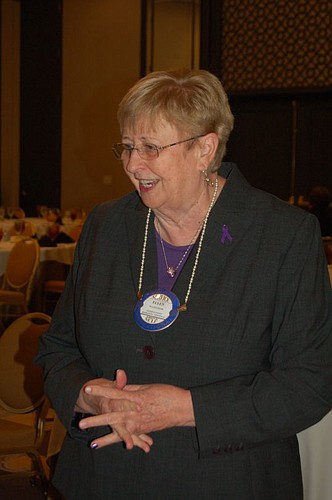
Chances are you know — or know someone who knows — a victim of domestic violence.
The crime is, however, one that may go unreported and is one of the most challenging to prosecute.
That was the message shared Monday with the Rotary Club of Jacksonville by executives from Hubbard House and the First Coast Child Protection Team, a detective with the Jacksonville Sheriff’s office and an assistant state attorney.
Ellen Siler is CEO of Hubbard House, Jacksonville’s domestic violence intervention center. Established in 1976 as the first such facility in Florida, last year more than 1,000 victims of abuse and their children sought help at the center.
In the past 17 years, 185 local cases of domestic violence resulted in homicide, including 11 in 2014. The suspects were male in 75 percent of the cases and 45 percent of the defendants had documented mental health issues.
Siler said receiving help and getting away from an abusive relationship can be the difference between life and death.
“The people who are dying are not the ones who call the police or come to Hubbard House,” she said.
Police officers are limited in what they can do in many domestic violence cases. Victims often have a change of heart between the time they call for help and when police arrive.
“A lot of times, victims are ashamed to admit they are victims,” said Detective Mindy Mesh of the Jacksonville Sheriff’s Office Special Assault Unit.
The biggest issue when it comes to prosecuting domestic violence is in many cases the victim is the only witness to the crime, said Assistant State Attorney Corelyn Crawford. She’s assigned to the Sexual Assault Unit and handles cases involving felony domestic violence, child abuse and sexual assault.
Crawford said out of about 6,000 domestic violence arrests reports reviewed last year, only about 2,000 of the cases were sent to the State Attorney’s Office. And it’s not uncommon for a defendant to be charged with a misdemeanor when a felony charge might be valid.
“We have to balance what the victim wants and what prosecutors think is appropriate,” said Crawford.
Even if an abuser is arrested when police respond to a call, the victim may not wish to prosecute.
“All domestic violence cases are like a ticking time bomb on your desk,” Crawford said. “You don’t know if it will be the next domestic violence murder.”
Hubbard House Chief Operating Officer Gail Patin said victims often are threatened by their abuser or a member of the abuser’s family if they decide to press charges. “There is a real fear to testify,” she said.
Avoiding the witness stand has been made easier in recent years by the courts allowing videotaped interviews to be presented as evidence, making it possible for victims to tell their stories without having to face the accused, said Dr. Kathleen Dully, a pediatrician and medical director of the UF Health First Coast Child Protection Team.
“It’s sometimes hard for victims to come forward because they know there will be hell to pay,” she said.
There are more than 20,000 reports of child abuse each year in Florida and about 4,000 in North Florida. The protection team gets involved in a case only after medical care is rendered to an abused child, but children are exposed to all forms of domestic violence.
“Not every child is injured, but they are witnesses. Sometimes, they are made to clean up mommy’s blood,” Dully said.
Tracy Thomas, a survivor of domestic violence, also spoke to the club. She entered a violent relationship at age 16 when she started dating a 23-year-old man who turned out to be an abuser.
Thomas said the first step was verbal abuse that soon escalated to physical abuse. She said she can’t remember the first time he hit her, but remembers when she had to go to the hospital with a broken collarbone after a particularly violent attack.
That’s when she fell into the pattern of denial and protecting the attacker.
“I made an excuse. I said I fell down some stairs,” said Thomas.
After eight years she got out of the relationship, but only after she was punched and kicked and then threatened with a shotgun she learned was loaded when her abuser fired the gun into the ceiling.
Thomas said if there is one idea she wants to share with victims of abuse and the people who care about them it’s that awareness is the key to ending the abuse.
“People need to know that there is hope. There is help. Please don’t give up,” she said.
(904) 356-2466